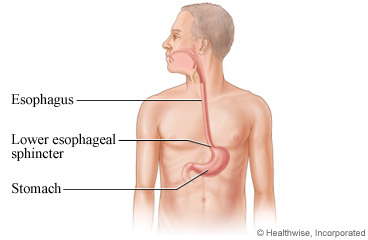Esophagectomy: Before Your Surgery

What is an esophagectomy?
An esophagectomy (say "ee-sof-uh-JEK-tuh-mee") is surgery to remove all or part of the esophagus. The esophagus is the tube that carries food from the throat to the stomach. Nearby lymph nodes and other tissue may also be removed. The doctor connects the remaining healthy part of the esophagus to the stomach so that you can still swallow and eat food. This surgery is mainly used to treat esophageal cancer. But it can also be used for other problems with the esophagus.
Esophagectomy may be "open" or "laparoscopic." Open surgery is done through cuts in the belly and the upper chest or neck. These cuts are called incisions. Laparoscopic surgery is done through several small cuts. The doctor puts a lighted tube, or scope, and other surgical tools through small cuts. The doctor is able to see your organs with the scope.
You have to be very careful about what you eat for 1 to 2 months after surgery and maybe for the rest of your life. You may have a feeding tube (J-tube) in your belly when you go home. This is to be sure you get enough nutrition. This will come out when you are able to eat normally. How long this takes varies. For many people, it takes 4 to 6 weeks after surgery. Your doctor will give you detailed information on your diet and how to use the J-tube.
You may feel weak after surgery. Take good care of yourself. Get enough rest and stay active. This can help you heal faster. You will probably need to take at least 6 to 12 weeks off from work. This depends on the type of work you do and how you feel. You will need more time to get better if you need other treatment for cancer, such as chemotherapy.
How do you prepare for surgery?
Surgery can be stressful. This information will help you understand what you can expect. And it will help you safely prepare for surgery.
 Preparing for surgery
Preparing for surgery
- Be sure you have someone to take you home. Anesthesia and pain medicine will make it unsafe for you to drive or get home on your own.
- Understand exactly what surgery is planned, along with the risks, benefits, and other options.
- If you take aspirin or some other blood thinner, ask your doctor if you should stop taking it before your surgery. Make sure that you understand exactly what your doctor wants you to do. These medicines increase the risk of bleeding.
- Tell your doctor ALL the medicines and natural health products you take. Some may increase the risk of problems during your surgery. Your doctor will tell you if you should stop taking any of them before the surgery and how soon to do it.
- Make sure your doctor and the hospital have a copy of your advance care plan. If you don't have one, you may want to prepare one. It lets others know your health care wishes. It's a good thing to have before any type of surgery or procedure.
What happens on the day of surgery?
- Follow the instructions exactly about when to stop eating and drinking. If you don't, your surgery may be cancelled. If your doctor told you to take your medicines on the day of surgery, take them with only a sip of water.
- Follow your doctor's instructions about when to bathe or shower before your surgery. Do not apply lotions, perfumes, deodorants, or nail polish.
- Do not shave the surgical site yourself.
- Take off all jewellery and piercings. And take out contact lenses, if you wear them.
 At the hospital or surgery centre
At the hospital or surgery centre
- Bring a picture ID.
- The area for surgery is often marked to make sure there are no errors.
- You will be kept comfortable and safe by your anesthesia provider. You will be asleep during the surgery.
- The surgery will take 3 to 8 hours.
When should you call your doctor?
- You have questions or concerns.
- You don't understand how to prepare for your surgery.
- You become ill before the surgery (such as fever, flu, or a cold).
- You need to reschedule or have changed your mind about having the surgery.
Where can you learn more?
Go to https://www.healthwise.net/patientEd
Enter P936 in the search box to learn more about "Esophagectomy: Before Your Surgery".
Current as of: October 19, 2024
